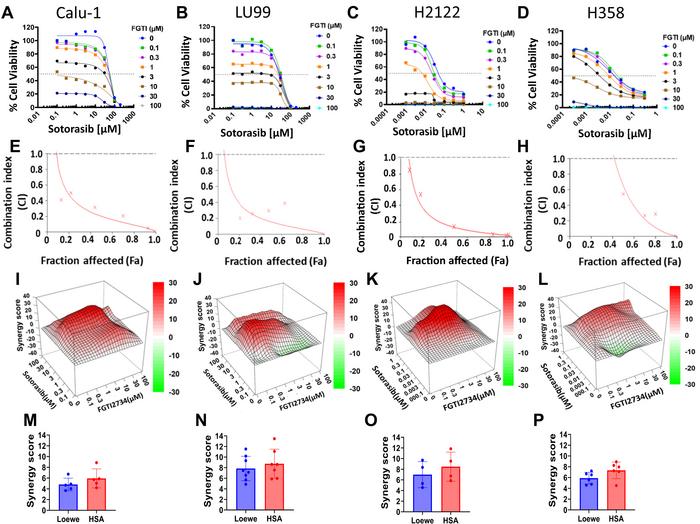A recent study from the VCU Massey Comprehensive Cancer Center has generated significant excitement in the fight against lung cancer, particularly in addressing treatment resistance associated with the KRAS G12C mutation. This unique mutation, prevalent in nearly 14% of non-small cell lung cancer cases, has posed a major roadblock for existing therapies such as sotorasib and adagrasib. These FDA-approved drugs have shown promise by directly targeting tumors with the KRAS G12C mutation, providing hope to patients previously left with few options. However, the nature of cancer cells and their ability to evolve has led to a predominant challenge: many tumors developed resistance post-treatment, rendering these therapies ineffective.
The mechanism of action for FGTI-2734 is particularly intriguing. The compound is designed to block the localization of wild type RAS proteins in the membrane of cancer cells, thereby interrupting a critical process known as ERK reactivation. This process, which allows cancer cells to escape the effects of sotorasib, becomes inhibited in the presence of FGTI-2734. As a result, cancer cells experience confusion and ultimately die, a phenomenon that signifies a remarkable stride towards counteracting treatment resistance in lung cancer. The research team’s findings underscore a promising pathway toward a paradigm shift in the treatment of lung cancer, further emphasizing the potential of targeted combination therapies.
These striking results emerge from experimental lab studies utilizing patient-derived tumors, leading to enthusiastic reactions from both the cancer research community and patients who face the challenges posed by lung cancer. The study’s prominence reflects on its publication in the Journal of Thoracic Oncology, where it was featured on the cover, garnering attention for its implications in the broader context of cancer research. The editor-in-chief provided an insightful breakdown, while an editorial from an international group of scientists further contextualized the gravity of these findings, pointing to their potential impact in reshaping clinical strategies in oncology.
As a follow-up to this groundbreaking discovery, collaborations among researchers at VCU have proved essential. Dr. Sebti collaborated with fellow researchers Aslamuzzaman Kazi, Hitesh Vasiyani, and Deblina Ghosh, collectively contributing their expertise in pharmacology and toxicology to bring this research to fruition. Additionally, the involvement of clinical specialists such as Jose Trevino and Rachit Shah from the Department of Surgery highlights the interprofessional nature of oncological research, emphasizing the importance of diverse expertise in driving forward cancer therapies.
The journey of developing FGTI-2734 underscores the inherent challenges in cancer research but also the relentless pursuit of innovation within the scientific community. The collaboration that birthed this experimental therapy was borne out of previous work conducted by Sebti and Andrew Hamilton during their tenure at Moffitt Cancer Center and Yale University, respectively. Such interdisciplinary cooperation showcases how fostering relationships across institutions can lead to transformative advancements in the understanding and treatment of cancer.
Patient outcomes could see a significant improvement if further clinical trials validate the initial findings of the study. The researchers are acutely aware that the road to translating bench research into bedside applications is fraught with hurdles. Nevertheless, the anticipation surrounding the potential for this combination therapy is palpable, with many in the field hoping for a subsequent breakthrough that could enhance the longevity and quality of life for those battling lung cancer.
Moreover, the implications of this study extend beyond immediate treatment options. It has the potential to inform future research avenues aimed at tackling drug resistance in various cancers beyond lung cancer, offering a template for combining existing and novel agents to increase treatment efficacy. As the scientific community continues to unravel the complexities of cancer biology, studies like this serve as a reminder of the critical role that innovative research plays in fostering hope and advancing the field.
Presently, the research team at VCU Massey Comprehensive Cancer Center remains dedicated to securing funding and regulatory approval to initiate clinical trials. This next phase is essential for transitioning from laboratory successes to tangible therapies that can effectively improve patient outcomes. For researchers like Dr. Sebti, sharing and implementing findings from the lab opens a pathway to realize the noble dream of making a real difference in the lives of cancer patients.
As the scientific exploration continues, both researchers and patients await the next steps in bringing FGTI-2734 and sotorasib combination therapy from hypothesis to application. The promise displayed in these initial findings echoes a growing sentiment in the cancer community: overcoming drug resistance is not merely a theoretical pursuit but an achievable goal that can redefine lung cancer treatment paradigms in the near future.
In summary, the research presented at VCU Massey Comprehensive Cancer Center stands as a beacon of hope in the often daunting landscape of cancer treatment. By integrating innovative therapies like FGTI-2734 with established pharmacological standards such as sotorasib, a new frontier in the battle against lung cancer emerges. The aspiration to move from bench to bedside is well underway, and with it, the prospect of effective, enduring solutions for patients facing the challenge of treatment-resistant lung cancer.
Subject of Research: Combination therapy for KRAS G12C lung cancer using sotorasib and FGTI-2734.
Article Title: FGTI-2734 Inhibits ERK Reactivation to Overcome Sotorasib Resistance in KRAS G12C Lung Cancer.
News Publication Date: Not specified in the provided content.
Web References: https://www.jto.org/article/S1556-0864(24)02485-7/fulltext
References: 10.1016/j.jtho.2024.11.022
Image Credits: Kazi, Aslamuzzaman et al.
Keywords: Lung cancer, drug resistance, combination therapies, precision medicine, cancer research.
Tags: combination therapy effectivenessenhancing treatment efficacy in oncologyFGTI-2734 experimental druginnovative cancer research advancementsKRAS G12C mutation therapieslung cancer treatment breakthroughsnon-small cell lung cancer optionsovercoming drug resistance in cancersotorasib and adagrasib limitationssynergistic cancer treatment approachestargeted therapies for lung cancerVCU Massey Comprehensive Cancer Center research





